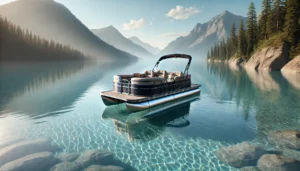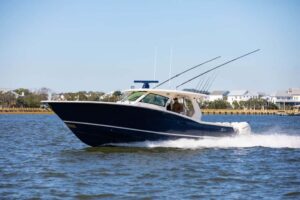Can You Finance a Boat with Bad Credit?

*BoaterUSA may receive a commission if you apply for and are approved for a boat loan through links in this article. This comes at no additional cost to you and helps support our content and platform. We only recommend financing partners we trust.
Financing a Boat When Your Credit Isn’t Perfect
Dreaming of hitting the water with your own boat but worried your credit history might hold you back? You’re not alone. Many boaters face the same challenge: wanting to finance a boat but having a credit score that’s less than ideal. The good news is that financing is still possible with bad credit, though it often comes with higher costs, stricter requirements, and a little more preparation on your part.
Boat loans aren’t as easy to qualify for as auto loans, since lenders view them as a “luxury purchase” rather than a necessity. That means they tend to look more closely at your credit history, your debt-to-income ratio, and how much money you can put down. But having poor credit doesn’t mean your boating dreams are out of reach. With the right approach, and by understanding what lenders look for, you can still get approved and make boat ownership a reality.
We’ll break down what “bad credit” really means, how it affects your financing options, the kinds of terms you can expect, and the smart steps that improve your chances of approval. By the end, you’ll have a clear idea of what to expect and where to start if you’re ready to apply.
What Counts as “Bad Credit?”
Credit Score Ranges Explained
When lenders talk about “bad credit,” they’re usually referring to a credit score below 580 on the FICO scale. Here’s how the ranges typically break down:
- 800–850 – Exceptional: Best possible approvals and lowest interest rates.
- 740–799 – Very Good: Easy approvals and favorable rates.
- 670–739 – Good: Most borrowers approved with competitive rates.
- 580–669 – Fair: Approval possible but with higher rates and stricter requirements.
- 300–579 – Poor: Considered “bad credit,” limited loan options, and often requires larger down payments or alternative financing.
Because boats are considered a luxury purchase, marine lenders often expect applicants to fall into the Good or higher range. Borrowers in the Fair or Poor categories may still get approved, but usually face more hurdles and higher overall costs.
Other Factors Lenders Consider
A credit score is only part of the picture. Lenders also evaluate:
- Debt-to-Income Ratio (DTI): How much of your income already goes toward existing debt.
- Credit History Length: A longer history shows consistency and reliability.
- Collateral: The boat itself acts as collateral, but additional requirements may apply with lower scores.
Why Bad Credit Makes Financing Harder
From the lender’s perspective, a lower score means more risk. That translates into higher interest rates, shorter repayment terms, or larger down payment requirements. While it makes approval more challenging, it doesn’t make it impossible — buyers with less-than-perfect credit finance boats every day by working within these conditions.
Can You Get a Boat Loan with Bad Credit?
Yes, But With Conditions
The short answer is yes — it is possible to finance a boat with bad credit. But the terms won’t look the same as they do for buyers with stronger credit. Lenders see borrowers with poor credit as higher risk, which means they’ll often require extra safeguards before approving the loan.
Common Requirements for Buyers With Poor Credit
If your credit falls in the Fair or Poor range, expect lenders to put additional conditions in place, such as:
- Larger Down Payments: Instead of the typical 10–15%, buyers with bad credit may be asked to put down 20–30% or more to offset the risk.
- Higher Interest Rates: While prime borrowers might see rates in the 6–9% range, bad credit applicants often face 12–18%+ interest.
- Shorter Loan Terms: Instead of spreading payments over 15–20 years, you may be offered a shorter repayment window, like 5–10 years.
- Stricter Collateral Requirements: The boat itself will almost always secure the loan, but in some cases, lenders may ask for extra assurances, especially with larger purchases.
Why Lenders Approve Some Applications and Deny Others
Two people with the same credit score can get very different results. That’s because lenders also weigh factors like income, employment stability, debt-to-income ratio, and even the age and type of boat you’re buying. A borrower with steady income and a 25% down payment might still get approved despite poor credit, while someone with high debt and no down payment could be turned away.
Loan Options for Buyers with Bad Credit
Having bad credit doesn’t automatically mean boat financing is off the table. It does, however, limit which loan options are realistic and what kind of terms you’ll be offered. Here are the most common paths buyers explore when their credit isn’t ideal:
Specialized Marine Lenders
Some lenders work directly in the boating world and are more experienced with applicants who don’t have perfect credit. These lenders often understand the value of different boat types and may be more flexible than a traditional bank. That said, they still protect themselves with higher rates and stricter loan conditions.
Dealer Financing
Boat dealers often partner with financing companies and can connect buyers to loan programs right at the point of purchase. This can sometimes be an easier way to get approved, though you may not always find the best rate compared to other lenders.
Credit Unions & Local Banks
While big national banks tend to be stricter, smaller community banks or credit unions can sometimes be more flexible, especially if you already have an account or relationship with them.
Personal Loans or Home Equity
In some cases, buyers with poor credit turn to personal loans or a home equity line of credit (HELOC). Personal loans are unsecured and usually carry high interest rates with shorter terms, while HELOCs may provide lower rates but use your home as collateral, a risk not everyone is comfortable with.
Your Best Next Step
If you’re serious about financing a boat with less-than-perfect credit, working with a financing partner who understands marine lending is often the smartest move. You can explore your options and get started with our recommended financing partner: New Boat Financing.
The Cost of Financing with Bad Credit
Higher Interest Rates
The biggest cost of financing with poor credit is the interest rate. Prime borrowers with strong credit often see boat loan rates between 6–9%, depending on the lender and loan term. With bad credit, however, rates can jump to 12–18% or higher, and that difference adds up quickly over the life of the loan.
Real-World Cost Comparison
Consider a $75,000 boat loan financed over 10 years:
- Good Credit (7% interest): Monthly payment comes out to about $870, with total interest paid over the loan around $29,500.
- Bad Credit (15% interest): Monthly payment jumps to roughly $1,210, and total interest paid soars to over $70,000.
That’s more than $40,000 extra in interest for the exact same boat, simply because of the credit score difference. Money that could have gone toward gear, fuel, or even a bigger boat.
Down Payment Requirements
On top of higher monthly payments, lenders usually require larger down payments from buyers with bad credit. Instead of the standard 10%, you may be asked to put down 20–30% or more. For a $75,000 boat, that’s $15,000–$22,500 upfront, compared to $7,500 for someone with good credit.
Insurance and Collateral Costs
Another cost to factor in is insurance. Lenders almost always require full coverage insurance when financing a boat, and that can add significantly to monthly expenses. For higher-risk borrowers, insurers may also charge more, adding yet another layer of cost.
How to Improve Your Chances of Approval
Bad credit doesn’t have to mean a dead end for boat financing. While the terms may not be ideal, there are smart ways to strengthen your application and improve your odds of getting approved.
Save for a Larger Down Payment
One of the most effective ways to offset a low credit score is by putting more money down. A larger down payment reduces the lender’s risk and lowers the total amount financed, which can help secure approval and sometimes even shave a little off the interest rate.
Apply With a Co-Signer
If you have a trusted family member or partner with stronger credit, adding them as a co-signer can make a big difference. Lenders often consider the higher credit profile in their decision, which can mean better terms than you’d qualify for on your own.
Choose a Smaller or Older Boat
It might not be your dream boat right away, but going with a less expensive vessel can make financing easier. A lower loan amount looks less risky to lenders and may open doors that would otherwise be closed. You can always upgrade later once your credit improves.
Pay Down Existing Debt
Improving your debt-to-income ratio (DTI) is another powerful way to strengthen your application. Paying off credit cards or personal loans before applying shows lenders you’re managing your finances responsibly, even if your credit score isn’t perfect.
Shop Around for Lenders
Not all lenders view credit scores the same way. Some are far more flexible than others, especially if you’ve demonstrated stable income and a solid down payment. If your first application is denied, don’t assume it’s the end of the road, keep looking until you find a lender who’s willing to work with you.
Alternatives to Traditional Boat Loans
Not everyone with bad credit will qualify for a boat loan, and in some cases, the terms may be so expensive that financing just doesn’t make sense. If that’s the case, there are still other ways to get out on the water.
Buy a Smaller or Older Boat With Cash
Instead of stretching your budget for a brand-new boat, consider saving up for a used or smaller model you can purchase outright. Boats depreciate quickly, so there are plenty of well-maintained older vessels available at a fraction of the cost of new ones. This approach avoids interest, down payments, and insurance requirements tied to financing.
Boat Clubs and Membership Programs
If your main goal is to get on the water without the long-term financial commitment, joining a boat club can be a great solution. For a monthly or annual fee, you’ll have access to a fleet of boats without the loan payments, storage costs, or maintenance hassles.
Fractional Ownership or Partnerships
Another alternative is to share ownership of a boat with a friend or family member. By splitting the cost, you reduce the upfront financial burden and ongoing expenses. Just be sure to set clear agreements on scheduling, maintenance, and responsibilities to avoid conflicts down the road.
Renting Instead of Owning
If you’re not ready for the commitment of ownership, renting may make more sense. Many marinas and outfitters offer daily or weekly rentals of fishing boats, pontoons, or center consoles. Renting gives you flexibility without locking you into a long-term financial arrangement while you work on improving your credit.
Pros and Cons of Financing with Bad Credit
Financing a boat with bad credit isn’t impossible, but it does come with some clear advantages and drawbacks. Understanding both sides can help you decide whether moving forward now makes sense or if it’s better to wait and improve your credit first.
Pros
- Access to the water sooner: Even with bad credit, financing may allow you to start enjoying boat ownership right away instead of waiting years to save.
- Opportunity to build credit: Making consistent, on-time payments can gradually improve your credit score, opening the door to better loan options in the future.
- Ownership benefits: Unlike renting or joining a club, financing gives you full control of the boat and the freedom to customize it however you like.
Cons
- Much higher overall cost: Higher interest rates and larger down payments make financing significantly more expensive with bad credit.
- Shorter terms and stricter requirements: You may not qualify for long loan terms, and lenders often set additional conditions to protect themselves.
- Risk of repossession: If you fall behind on payments, the lender can repossess the boat, leaving you without the vessel and without the money you’ve already put into it.
Is Financing a Boat with Bad Credit Right for You?
Financing a boat with bad credit is possible, but it comes with trade-offs. Higher interest rates, larger down payments, and shorter loan terms can make ownership more expensive than it would be for someone with stronger credit. For some buyers, that extra cost is worth it to get on the water now. For others, it may be smarter to hold off, work on improving their credit, and come back later in a stronger position.
The key is knowing your options, being realistic about what you can afford, and making sure the loan terms won’t turn your dream purchase into a financial burden. With careful planning and by choosing a lender that understands marine financing, you can still make boat ownership a reality, even if your credit isn’t perfect.
If you’re ready to explore your options, you can get started with our trusted financing partner, New Boat Financing.
Follow us on social media!
Search
Recent Posts
When dreaming of owning a boat,…











